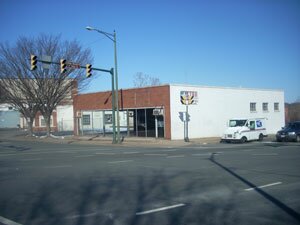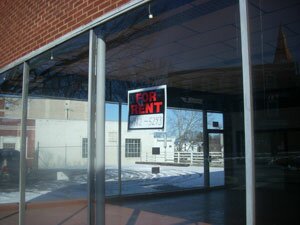ON ARCHITECTURE- Condo Land: Making headlines, little headway


A year ago, city planners were working out the details for a proposed 9-story mixed use tower at the old RSC Rental site. Now the space is for rent.
PHOTOS BY DAVE MCNAIR
When it comes to high-rise condominium projects downtown, the preferred development of new urbanists and Charlottesville city planners, it appears there are two types: those that are discussed ad nauseam by city planners and get lots of attention, and those that actually get built.
Over the last four years, a number of ambitious projects have made headlines, but little headway; the 9-story First & Main project on the Downtown Mall, the elaborate 4-story Waterhouse Village on Water Street, a massive "green" tower at 201 Avon, the 9-story West Main/Ridge-McIntire project, and Coran Capshaw's Coal Tower project to name just a few.
Meanwhile, high-end condos like the Randolph and the Gleason have been quietly moving forward, despite the sour economy.
In 2006, at the height of the condo craze, architect/developer Bill Atwood's Waterhouse Village LLC bought 218 Water Street from developer Oliver Kuttner for $4.5 million, a whopping $3.9 million more than Kuttner paid for the property in 1994.
But last summer Atwood began giving hints that all was not ideal in condo-land.
"The economic environment in the development business, particularly residential condominiums, is probably at an all-time low," he told the Daily Progress in August.
Six months later, things don't appear to be getting any better. "Nothing is great right now," says Atwood. "Even if I had buyers, I'd be worried. People are walking away from projects and purchases. Look at the Landmark [hotel]...stuff like this is happening all over the country."
Atwood says they are taking it "very, very slow" with the Waterhouse project. In fact, he says they've begun looking at Waterhouse as a "vertical subdivision" that will be worked on piecemeal, with smaller scale condos being built as buyers are found.
"When we started this project, banks thought that condominiums were the greatest things since the stars in the sky," he told the DP last August.
Now that bank lending for such projects has come to a screeching halt, what's to become of all those hoped-for high-rises?
At the old RSC Rental building on the corner of West Main and Ridge/McIntire, where Richmond-based developer Bob Englander wants to build a 9-story, 60-unit mixed-use tower, the new for-rent sign in the window tells a tale.
After months of discussion with city planners, during which Englander accepted all the Board of Architectural Reviews demands and offered a $300,000 affordable housing proffer and $200,000 in streetscape improvements, City Council finally approved the project last September. Four months later, however, the project appears to be another victim of the economic crisis.
"We're still pursuing the project," says Englander, " but we're not sure how it's going to evolve. We won't really know anything until the banking situation changes, and it's pretty clear that financing for this kind of project isn't going to be available for quite awhile."
For developers like Englander, who does not own the building (it's owned by Russell Mooney, Jr., who inherited the property from his father, which was Mooney's Oldsmobile in the 50s and 60s, before the other buildings along that intersection were razed) and never secured financing, it's unlikely that their towers will get built. Indeed, Englander doesn't sugar-coat the situation.
"Until the banks can get rid of these toxic assets on their books," he says, "they're not going to do anything. I've been in the real estate business since the 1970s, and this is the worst I've seen it."
So is this freeze on lending going to end anytime soon?
"No. That's my gut feeling," says Englander. "It's going to be later than sooner. Hopefully, the government can help solve the problem in the banking industry."
Indeed, it appears that banks can't even get their own buildings built.
Last March, Chevy Chase Bank demolished the Exxon gas station at the corner of Barracks Road and Emmet Street. At the time, construction manager Zach Schneider said the new bank would be finished by the end of July, but nothing has happened on the site since the gas station went down. According to city development manager Missy Creasy, Chevy Chase secured approval for the project, but calls to Chevy Chase and the contractor, Maryland-based Buch Construction, were not returned.
While Coran Capshaw's coal tower developer Dillon Baynes also couldn't be reached for comment, a comment he made during a February 2007 Planning Commission meeting is revealing: "We're taking a pause given the uncertainty over the condo market."
According to City development manager Missy Creasy, a final site plan has still not been submitted, and the developer has applied for a plan deferral that lasts until May.
Back in the heady days of the condo craze in 2006, there 362 condos sold–- a 133 percent annual increase, as several area apartment complex owners convert their units.
Now, according to a Charlottesville Area Association of Realtors market report, condo sales in the city have declined 30 percent since 2006, and sales in the county, where most of the conversions took place, have plummeted over 50 percent.
"We saw an opportunity when the market got hot," says developer Rip Cathcart, who converted his 164-unit Carriage Hill apartment complex into condos in 2005, "but we had a chair to sit in when it turned bad."
Cathcart says that when the condo craze came to a halt, he simply began renting his luxury units again, and he says business is good.
"People aren't buying, but they have to live somewhere," he says. "We're on the lucky side of the housing problem. Higher end rentals, knock on wood, are doing well."
But he acknowledges it's tough now for new projects or conversions.
"When the foundation of a project is built on selling the condo units, the developers can't afford to rent," says Cathcart.
Still, while Cathcart thinks that new projects are not going to happen anytime soon, he remains optimistic. "As a function of the low interest rates and prices we're beginning to see," he says, "buyers may reach a point where they start thinking that they have an opportunity. Then we'll start to see things turning around."
~
This is the first part of a two-part report on downtown condo projects. Check in next week to find out why the Gleason and the Randolph appear to have succeeded, what developers have to say about the current market, and where the downtown condo trend is headed.
#